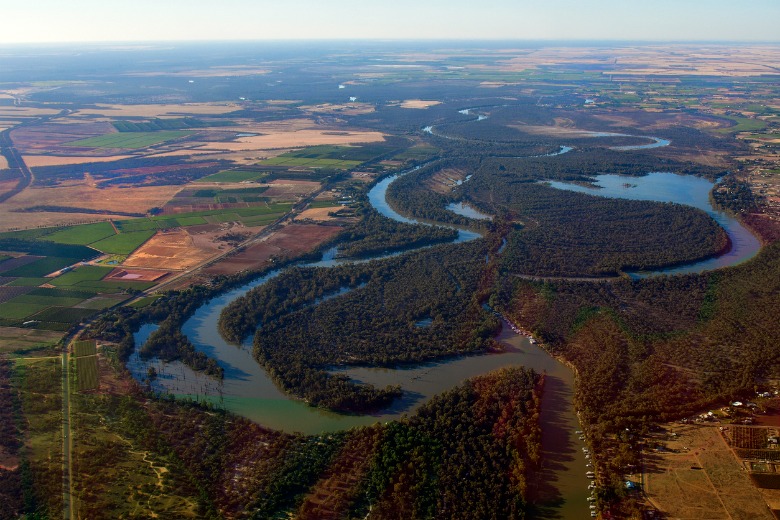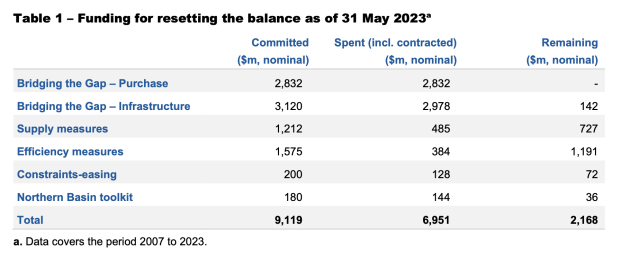
The Murray-Darling Basin plan won’t be delivered on time or on budget despite a recently announced extension of the deadline, the Productivity Commission says.

The Basin Plan was put in place in 2012 in response to concerns about the over-allocation of water from Australia’s largest river system.
Under the original plan, the Commonwealth and basin state governments (Victoria, NSW, SA, Queensland and the ACT) agreed to recover 2,750GL of water a year for the environment by June 2024, plus an additional 450GL/y through improved efficiency.
The government commited $5.95 billion to recovering 2,750 GL/y; $1.21 billion for supply measures and $1.8 billion for boosting efficiency. Only $2 billion of that is left, the report shows.
The federal government announced on August 22 it had extended the date for the return of the 450GL to 2027 in recognition that deadlines wouldn’t be met.
But an interim report from the Productivity Commission, released on Monday, says the proposed extension of the timeframe is unlikely to be enough, and a significant water recovery shortfall is likely.
“A new agreement to deliver the Basin Plan will, if legislated, provide more time and allow new supply measures and voluntary water purchases. But this will not be enough to implement the Basin Plan in full,” it concludes.
“The Basin Plan will not be fully implemented on time or on budget.”

It says key supply measures, including infrastructure works and rule changes to offset water recovery, won’t be delivered and projects to ease constraints on river operations are progressing slowly, with a possible predicted shortfall of 315GL/y.
The plan to recover 450GL/y of water via efficiency measures will also fall ‘well short of the target’, the report says, with only 26GL/y recovered so far.
“Weak accountability and other underlying risks to Basin Plan implementation remain,” the report says. “Existing funding is also not sufficient.”
Call for renewed recovery program
The report calls for a renewed water recovery program, and has backed water buybacks, a contentious issue that the government has indicated it intends to pursue.
“The Australian Government should develop a renewed approach to water recovery, including staged voluntary purchases,” the commissoin says.
“Waiting until reconciliation (now proposed for the end of 2026) to address the shortfall will perpetuate uncertainty for Basin communities and risks further increasing the cost of water recovery.”
It also recommends establishing a new government-owned corporate entity that operates “at arms length from government” to undertake water recovery and implement some supply projects, and says funding for unviable supply projects should be cut.
“A new government-owned corporate entity that operates at arm’s length from governments is an option for undertaking water recovery and implementing some supply projects,” it says.
Further efforts should be made to ease river constraints on environmental delivery and the government should implement them through a dedicated, standalone program.
Little progress
Associate Commissioner Chris Guest said very little progress has been made since the Commission last reviewed the plan five years ago, and basin governments need to be more transparent and accountable for delivering the plan.
“The Australian Government Minister for Water should report annually to Parliament on the progress, feasibility and cost to date of supply projects, and decide on their future,” he said.
NSW is also lagging on its water resource plans, which were due in 2019 but remain outstanding, the commission said.
The Productivity Commission is required by legislation to undertake an inquiry every five years into the effectiveness of the implementation of the Basin Plan and water resource plans. This is the second such inquiry.
Written submissions on the interim report can be made until November 20. A full five-yearly report is due on December 19.
More information is available here.
Comment below to have your say on this story.
If you have a news story or tip-off, get in touch at editorial@governmentnews.com.au.
Sign up to the Government News newsletter